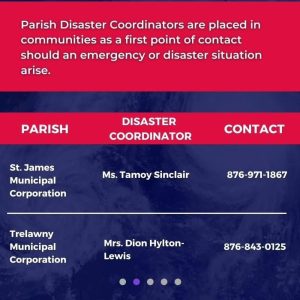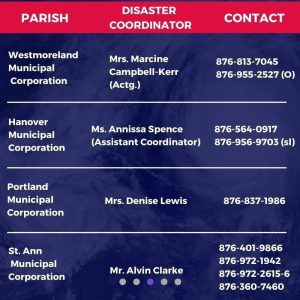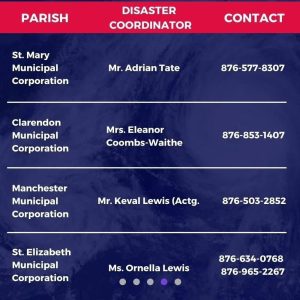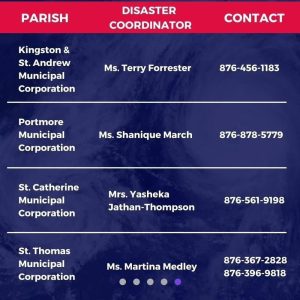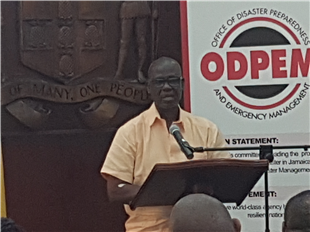
ADDRESS BY HON. DESMOND McKENZIE MINISTER OF LOCAL GOVERNMENT AND COMMUNITY DEVELOPMENT AT THE OFFICIAL LAUNCH OF DISASTER PREPAREDNESS MONTH &THE OBSERVANCE OF THE ATLANTIC HURRICANE SEASON
The official observance of this year’s Atlantic Hurricane Season is a crucially important exercise.
It is a potent symbol of the seriousness with which the Government takes the Hurricane Season. It is also one of the ways in which this Administration intends to sharply raise the current levels of public awareness and public acceptance of the need for a far greater level of disaster preparedness.
The blunt truth is that as a nation, we continue to disregard the power of personal responsibility to prevent disasters.
There is a worrisome mixture of ignorance, fatalism and defiance that continues to characterize much of the public attitude to disaster preparation. Too many of us continue to believe that once the Agencies of the states clean the gullies and drains, all we have to do is rush to the stores and buy supplies once a Hurricane is announced.
I sincerely hope that the recent rains that occurred over a matter of days in April and May, and which resulted in hundreds of millions of dollars in damage, have snapped us into reality. There was one critical lesson, within all the misery that some of our citizens regrettably experienced, especially in Clarendon. The rains were so intense that the storm-water drainage systems, which were clear, were nonetheless overwhelmed.
When Hurricane Matthew blew past us in early October last year, we were again reminded of the need for preparation. We are challenged as never before, to take disaster preparation, and between today and November 30, Hurricane preparation, far more seriously.
One of the challenges we must tackle is that of unauthorized land use across the country. From my time on the Opposition benches of Parliament, I have raised the point that we must formally identify and enforce No Build Zones.
Generally speaking, these are areas that are so vulnerable to disasters that mitigation efforts are uneconomical or simply impossible. Outside of this however, we all know for example, that gully-banks are not places for people to live or establish businesses, yet many across the country are occupied in these ways. Disaster management can never be fully carried out, unless the issues surrounding squatting are addressed in a fundamental way over time.
Currently, residential squatting is the dominant type of adverse possession activity across the country, and is evident in over 754 settlements comprising a population in excess of 600,000 people. Approximately twenty percent (20%) of Jamaica’s population resides in informal settlements, and in the context of hurricanes, these areas are especially prone to flooding, landslides and storm surges.
Of the 585 mapped squatter settlements in Jamaica, 138 of them are within 100 metres of a waterway. More than 50% of the squatter settlements in Kingston & St. Andrew and St. Thomas are within 100 metres of a waterway.
A large number of the settlements are on gully-banks, which are not constructed to withstand the weight of housing developments. Furthermore, the reservation regulations with regard to waterways are being breached by the presence of these structures.
This matter has the attention of the Prime Minister, who is also Chairman of the National Disaster Risk Management Council. One of the things I will be doing shortly, in my capacity as Minister and as Deputy Chairman of the Council, is to move the Building Bill 2017, which has already been tabled in the House of Representatives.
One of the objectives of the Bill is the prevention of squatting, which is an endemic feature of areas vulnerable to disasters. This law, when passed, will work hand-in-hand with the Disaster Risk Management Act 2015, to deal with structural and land-use issues, to ensure that the national exposure to disasters is significantly reduced.
Naturally, we do not wish to experience any Hurricanes this year. However, let me also use this opportunity to publicly advise that, the Government is empowered under Section 27 of the Disaster Risk Management Act to take any necessary action. If the Prime Minister declares any place as a Threatened Area or a Disaster Area, the measures permitted include:
- The Direct evacuation of the Area.
- Instructions for people to leave any particular premises.
The Office of Disaster Preparedness and Emergency Management (ODPEM) continues to work to ensure that the country is as prepared as possible for any eventuality that may arise during the season. ODPEM continues to co-ordinate the management of preparations for the Hurricane Season, and is ready to provide the assistance needed should the need arise.
You will recall that I indicated to Parliament in April, that the need for structural changes to our waterway network will be addressed. The review of our drain and gully systems is now being undertaken by our Technical staff, in collaboration with the National Works Agency. We are serious about ensuring that flooding does not remain part of our normal experience.
I also indicated in Parliament, that there will be a review of the types and numbers of Shelters across the country. I expect to report to the country shortly about the outcome of the review and the way forward.
This Administration is determined to create and maintain a momentum of urgency in the public mind, about Hurricane preparedness.
We must understand and accept that we cannot continue to throw money at cleanup and other restoration efforts year after year, once heavy rains or Hurricanes occur. This is money that should be invested in various areas of public life, to promote and preserve prosperity.
The significant threats to Gross Domestic Product presented through hurricanes, are major barriers to our economic growth target of 5% per annum, beginning in 2020. They are also an impediment to Jamaica’s Developed Country Status ambitions as outlined in Vision 2030.
I ask every citizen of this country to expect, and prepare for, an active Hurricane Season for 2017. What does this mean?
- It means checking our houses and workplaces for flaws in the walls, roofing and elsewhere.
- It means we should start now, to gradually buy the items that we would need if a disaster comes, rather than buy all at once, and still have some area of concern unaddressed.
- It means we should begin to consider and make emergency arrangements with friends and family now, so that we can better manage our personal affairs if disaster strikes.
- It means a commitment, not only this year but every year, to stop dumping household and industrial garbage into drains and gullies. PERSONAL RESPONSIBILITY IS THE KEY THIS YEAR AND EVERY YEAR.
Therefore, let us work together, to ensure that the passage of Hurricanes becomes a reality we effectively manage with minimum stress, rather than a nationally disruptive experience.
Partnership is a principal emphasis of the Government. We want to work with all our citizens, on the basis of shared responsibility.
The Administration has a special responsibility for national disaster preparation. You have, as a citizen of Jamaica, an individual and personal responsibility to ensure that you do everything necessary to prevent harm to yourself and others.
Let’s devote our time and energy, to preparing more and repairing less. That is my appeal. Together, we can make it work.


